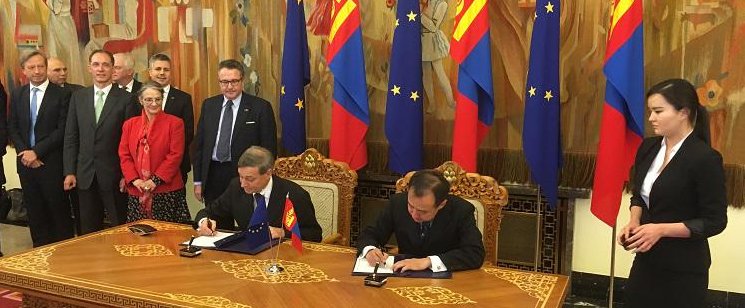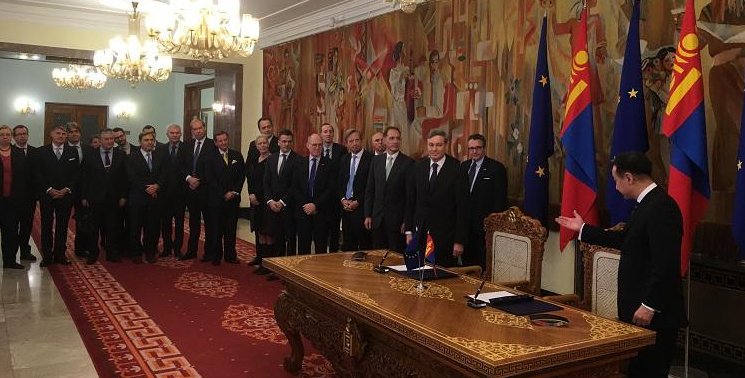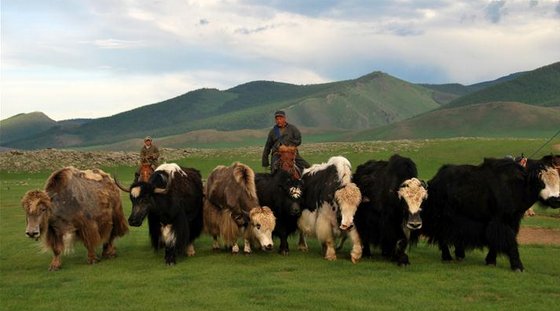“HAIR OF KASHMIR GOATS” – ONE OF EU’S 36 ‘TRADE DEALS’

Example of one of the EU’s 36 “trade deals in force” – Mongolia
In November 2017 we predicted Mongolia would be added to the list of the EU’s “trade deals in force”. We weren’t wrong.
Mongolia is now on the EU’s list of the trade deals which the BBC and Sky News are expecting the Rt Hon Dr Liam Fox, International Trade Secretary, to replicate post-Brexit.
In yesterday’s edition of Brexit Facts4EU.Org we gave a summary of the disastrous track record of the EU in negotiating trade deals. We showed that the BBC’s criticism that Dr Fox’s International Trade Dept was now ‘prioritising’ was not only bizarre (because this is what you do in business), but also that there were only half the number of EU trade deals in force with external countries which the BBC claimed.
Of the 36 EU agreements in force’, we present an example – that of Mongolia

EU signs Delegation Agreement in Mongolia © EU Commission
1st November 2017 was a significant day in the history of Ulaanbaatar. The government based in the capital of Mongolia was celebrating the ratification by all EU member states of the EU’s latest “trade deal”.
The EU’s Partnership and Cooperation Agreement (PCA) with Mongolia came into force on 1st November, replacing the 1993 Agreement on trade and economic cooperation between what was then the European Economic Community and Mongolia.
The EU’s own website on Mongolia says the following :-
“The EU is one of Mongolia's main trading partners. In 2015, the total trade value between the EU and Mongolia reached €403 million, of which Mongolia’s exports to the EU were €84 million and EU exports to Mongolia €319 million. The main exports from Mongolia to EU are raw materials and textiles (especially hair of Kashmir goats)…”
Putting aside Mongolia's exports of goat hair to the EU, look at the EU's exports to the EU. €319 million? Not only is this tiny in terms of international trade, it is hardly likely to prove fertile ground for British exporters.
Brexit Facts4EU.org Summary
MONGOLIA BASIC FACTS
- Population : 3.1 million
- Capital : Ulaanbaatar
- Language : Mongolian
- GDP : USD $13 bn. That’s 0.45% of the UK’s – over 200 times smaller than the UK economy
- Mongolia’s economy is 133rd in the world, according to the IMF in 2018
- Currency : Tögrög
The new EU Partnership and Cooperation Agreement with Mongolia was in fact signed on 30th April 2013. It took four and a half years for the EU to get it ratified by all 28 member states.
The ‘trade’ deal
The EU-Mongolia agreement runs to 45 pages and you can read it here. It contains 65 Articles, only 14 of which are in the trade section. Of these 14 Articles, some are rather basic. For example:-
Article 22 - Capital movements
"The Parties shall endeavour to facilitate the movement of capital in order to promote the objectives of the Agreement."
And
Article 26 - Regional policy
"The Parties shall encourage the regional development policy."
The EU Delegation to Mongolia

EU signs Delegation Agreement in Mongolia © EU Commission
There are 22 delegates from the EU in the picture above and just one Mongolian. It was taken on 02 Nov 2017 in the capital Ulaanbaatar at the ceremony to establish the EU’s ‘Delegation to Mongolia’. We have other pictures where over 30 EU officials are present.
With the greatest respect to Mongolia, we're unsure that the Rt Hon Dr Liam Fox MP, Secretary of State for International Trade, would decide to send 30 of his officials to Mongolia to sign such an agreement. He might feel they were better spent talking to the massive economies around the world with which the EU has no form of trade deal whatsoever, and which might become significant trading partners in growing the UK economy.
Gongs and EU expansionism
The new EU Ambassador is Herr Hans Dietmar Schweisgut, who was awarded with the Order of the Polar Star by the Mongolian President, the highest honour that can be given to a foreigner. At the time the EU announced with great pride that this was the EU’s 140th Delegation around the world.
Think we’ve chosen an extreme an example with Mongolia? Think again
We could have chosen other countries on the EU’s list of ‘agreements in place’, such as Armenia (134th economy in the world), Kosovo (146th) or even Lesotho (164th), or others.
These countries all appear in the list of the 36 countries for which the EU declares that ‘agreements are in force’.
Observations
Back in 2017 we wrote:-
“There are a number of observations we could make about this news from the EU last week. We could point out that this country will no doubt now be added to the list of countries with whom the EU has a ‘trade agreement’.”
We were not wrong. Mongolia is now on the EU’s list of ‘agreements in force’ which we published yesterday.
Yes, the EU classifies a ‘Partnership and Cooperation Agreement’ as one of the three types of trade agreements it has around the world.
We could also point out that if you read this agreement (we have, alas) it is vaguely worded and is mostly to do with intentions rather than actions, and so much of it is concerned with political matters rather than commercial ones.
For example, here are the main headings of the document:
- Nature and Scope
- Bilateral, Regional And International Cooperation
- Cooperation On Sustainable Development
- Cooperation On Trade And Investment Issues
- Cooperation In The Area Of Justice, Freedom And Security
- Cooperation In Other Sectors
- Means Of Cooperation
- Institutional Framework
- Final Provisions
So much of the document is waffle and announces grand aspirations on the social level. We very much doubt that the average Mongolian goat herder will care too much about the EU’s Millennium Development Goals, for example.
The EU and your money
Winters are often harsh in Mongolia, where there is a climatic phenomenon known as “Dzud”. In 2017, the European Commission provided over €115,000 EUR in humanitarian funding for herders because of the cold winter.

Mongolian herders - © Unknown
The Commission gave this as emergency funding because of the extreme conditions. The only problem is that the EU’s own Delegation noted that “The Dzud, characterised by a prolonged summer drought followed by severe winter conditions, is not uncommon in Mongolia.” It admitted that the Commission had already provided €420,000 EUR in 2015.
These are not large sums on their own, but if the EU were to provide financial assistance to every country that asked for it, for regular weather conditions, we wonder just how big the tax-payers’ bill would become.
What's the point?
The point of our occasional articles like these - on news which no-one else covers - is not because of the precise details of each story. These articles taken together enable readers to form a picture in their minds of the mentality of the people running the European Union.
These articles also demonstrate the sense of priorities of the EU elites, where ordinary people’s livelihoods take second place to political considerations. And of course they also help you to realise where the vast amounts of taxpayers’ money are going.
We hope you find them useful.
Our daily work since before the Referendum costs money. No-one else does the research we do each day, nor publishes facts like these. We need your help. Please donate something today if you can.
[ Sources: EU Commission | EEAS | IMF ] - 13 Feb 2019
Since before the EU Referendum, Brexit Facts4EU.Org
has been the most prolific researcher and publisher of Brexit facts in the world.
Supported by MPs, MEPs, & other groups, our work has impact.
We think facts matter. Please donate today, so that we can continue to ensure a clean Brexit is finally delivered.
Paypal Users Only - Choose amount first
Quick One-off
Monthly


Something to say about this? Scroll down for reader comments